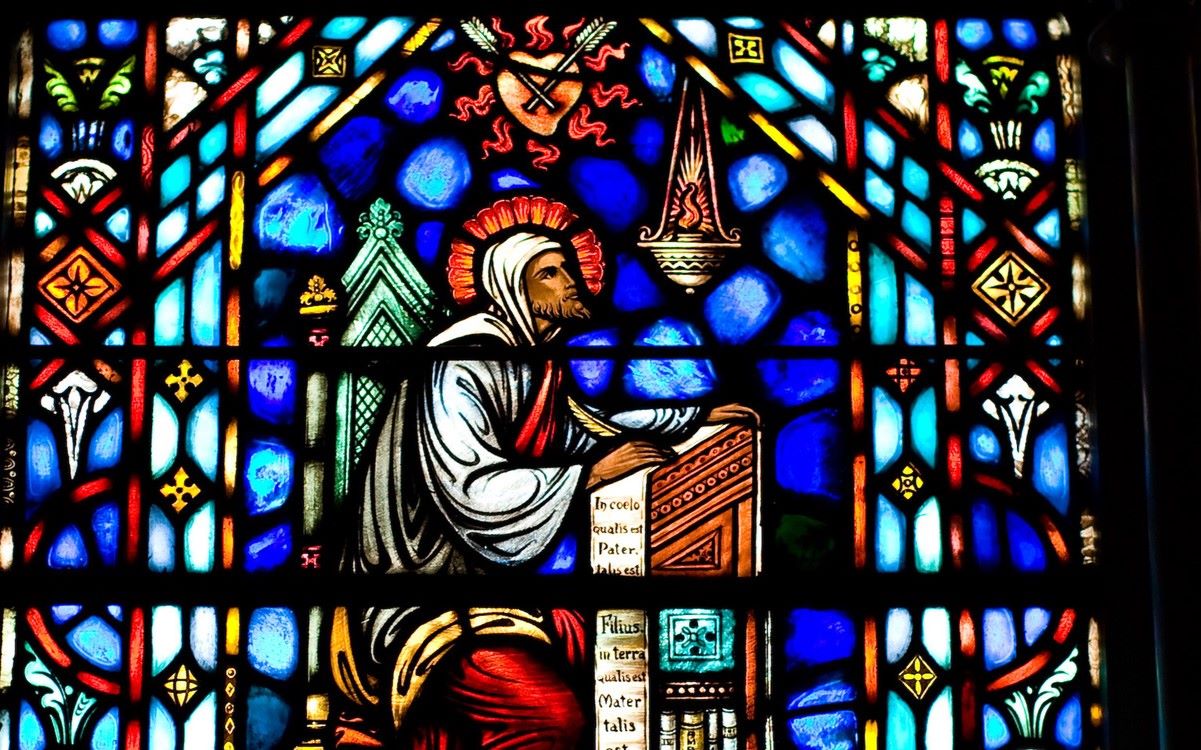Home>Theology and Spirituality>Why Is The Baptism Of Jesus Important?


Theology and Spirituality
Why Is The Baptism Of Jesus Important?
Published: February 26, 2024
Peter Smith, Editorial Director at Christian.net, combines deep insights into faith, politics, and culture to lead content creation that resonates widely. Awarded for his contributions to religious discourse, he previously headed a major organization for religious communicators, enhancing dialogue on faith's societal impacts.
Discover the significance of the baptism of Jesus in theology and spirituality. Explore its importance and impact in Christian faith and practice.
(Many of the links in this article redirect to a specific reviewed product. Your purchase of these products through affiliate links helps to generate commission for Christian.net, at no extra cost. Learn more)
Table of Contents
The Significance of Jesus' Baptism
The baptism of Jesus holds immense significance in the Christian faith. It marks the beginning of Jesus' public ministry and serves as a pivotal event in his life. This sacred act not only symbolizes purification and repentance but also signifies the divine affirmation of Jesus as the Son of God. The baptism of Jesus is a profound moment that carries deep spiritual and theological meaning for Christians around the world. Let's delve into the reasons why the baptism of Jesus is so important.
-
Fulfillment of Prophecy: The baptism of Jesus fulfills the prophecy in the Old Testament. In the book of Isaiah, it is foretold that a voice will cry out in the wilderness, preparing the way for the Lord. This prophecy is fulfilled through John the Baptist, who baptizes Jesus in the Jordan River. This connection to ancient prophecy underscores the divine plan and reinforces the significance of Jesus' baptism in the Christian narrative.
-
Identification with Humanity: Through his baptism, Jesus identifies with humanity and demonstrates his solidarity with the human experience. Despite being sinless, Jesus chooses to undergo baptism, aligning himself with the act of repentance and purification. This act of humility and solidarity with humanity is a powerful testament to Jesus' compassion and understanding of the human condition.
-
Anointing by the Holy Spirit: As Jesus emerges from the waters of baptism, the Holy Spirit descends upon him in the form of a dove, and a voice from heaven proclaims, "This is my beloved Son, with whom I am well pleased." This divine affirmation marks the beginning of Jesus' public ministry and signifies the anointing of Jesus by the Holy Spirit for his divine mission on earth. The baptism of Jesus thus serves as a profound revelation of the Holy Trinity, with the presence of the Father, Son, and Holy Spirit.
-
Model for Believers: Jesus' baptism serves as a model for believers, emphasizing the importance of repentance, obedience to God, and the reception of the Holy Spirit. It sets an example for Christians to follow, highlighting the significance of baptism as a symbol of spiritual rebirth and initiation into the family of God. The baptism of Jesus not only inaugurates his ministry but also sets a precedent for the sacrament of baptism in the Christian tradition.
In essence, the baptism of Jesus holds deep theological significance, serving as a pivotal moment in the life of Jesus and carrying profound implications for Christian belief and practice. It represents the fulfillment of prophecy, the identification with humanity, the anointing by the Holy Spirit, and a model for believers to follow. This sacred event continues to inspire and guide the faith of millions of Christians worldwide, underscoring the enduring importance of Jesus' baptism in the Christian tradition.
Read more: Why Is The Baptism Important
The Connection to Old Testament Prophecy
-
Fulfillment of Prophecy: The baptism of Jesus holds profound significance as it fulfills the prophecy recorded in the Old Testament. The book of Isaiah, written centuries before the birth of Jesus, contains a prophetic declaration that a voice would cry out in the wilderness, preparing the way for the Lord. This prophecy finds its fulfillment in the ministry of John the Baptist, who emerges in the wilderness, preaching a message of repentance and preparing the people for the coming of the Messiah. The baptism of Jesus by John the Baptist in the Jordan River serves as a direct fulfillment of this ancient prophecy, establishing a powerful connection between the events of Jesus' life and the prophetic utterances of the Old Testament.
-
Divine Plan Unfolding: The fulfillment of Old Testament prophecy through the baptism of Jesus underscores the intricate tapestry of the divine plan. It signifies the continuity of God's redemptive work throughout history and demonstrates the meticulous orchestration of events leading to the arrival of the long-awaited Messiah. The alignment of Jesus' baptism with the prophetic words of Isaiah reinforces the divine authority and intention behind this pivotal moment, emphasizing the divine foreknowledge and sovereignty at play in the unfolding narrative of salvation.
-
Historical and Spiritual Continuity: By fulfilling the prophecy of the voice in the wilderness and the preparation for the Lord's coming, the baptism of Jesus establishes a profound continuity between the Old Testament and the New Testament. It bridges the gap between the prophetic anticipation of the Messiah and the manifestation of Jesus as the fulfillment of those ancient prophecies. This connection serves to affirm the historical and spiritual continuity of God's redemptive plan, highlighting the seamless thread of divine purpose woven throughout the pages of Scripture.
-
Reaffirmation of Faith: For believers, the connection between Jesus' baptism and Old Testament prophecy reaffirms the trustworthiness and reliability of God's Word. It serves as a tangible demonstration of the faithfulness of God in fulfilling His promises and underscores the significance of Jesus' role as the fulfillment of Messianic prophecies. The alignment of Jesus' baptism with the prophetic utterances of the Old Testament provides a compelling testimony to the divine inspiration and authority of Scripture, strengthening the faith of believers and reinforcing the foundational truths of the Christian faith.
In essence, the connection between Jesus' baptism and Old Testament prophecy serves as a powerful testament to the fulfillment of ancient promises, the unfolding of the divine plan, the continuity of God's redemptive work, and the reaffirmation of faith in the reliability of Scripture. This profound connection underscores the deep significance of Jesus' baptism in the Christian narrative and reinforces the foundational truths of the Christian faith.
The Role of John the Baptist
-
Forerunner of the Messiah: John the Baptist played a pivotal role as the forerunner of the Messiah, preparing the hearts of the people for the arrival of Jesus. His ministry in the wilderness, marked by preaching a message of repentance and baptizing those who responded, served as a profound catalyst for the anticipation of the coming Messiah. John's role as the herald of the Messiah positioned him as a central figure in the narrative of Jesus' arrival, bridging the prophetic anticipation of the Old Testament with the manifestation of Jesus' ministry.
-
Prophetic Fulfillment: John the Baptist's ministry and his baptism of Jesus fulfilled the prophetic declarations found in the Old Testament. The book of Isaiah foretold the voice that would cry out in the wilderness, preparing the way for the Lord, and the arrival of John the Baptist as the fulfillment of this prophecy established a direct link between the ancient prophetic utterances and the unfolding events surrounding Jesus' baptism. John's obedience to his divine calling and his role in preparing the hearts of the people for the ministry of Jesus underscored the intricate fulfillment of Old Testament prophecies through his life and ministry.
-
Humility and Servanthood: John the Baptist exemplified humility and servanthood in his willingness to fulfill his role as the forerunner of Jesus. Despite gaining a following of his own, John consistently directed the attention towards the coming Messiah, declaring that he was unworthy to even untie the sandals of the one who was to come. His humility and unwavering commitment to his mission as the herald of Jesus' ministry demonstrated a profound example of selflessness and servanthood, emphasizing the central focus on Jesus as the ultimate fulfillment of God's redemptive plan.
-
Baptism as a Symbol of Repentance: John the Baptist's baptism, characterized by immersion in the waters of the Jordan River, symbolized repentance and spiritual renewal. The act of baptism served as a powerful symbol of cleansing and preparation, signifying a turning away from sin and a readiness to receive the message of the coming Kingdom. Through his baptism of repentance, John prepared the hearts of the people for the transformative message of Jesus, laying the foundation for the spiritual awakening and renewal that would accompany the ministry of the Messiah.
-
Enduring Legacy: John the Baptist's unwavering commitment to his role as the forerunner of Jesus left an enduring legacy in the Christian faith. His bold proclamation of repentance, his humility in acknowledging the supremacy of Jesus, and his faithful obedience to his divine calling continue to inspire and challenge believers to this day. The role of John the Baptist in preparing the way for the ministry of Jesus stands as a timeless example of faithful servanthood and wholehearted dedication to the purposes of God, leaving an indelible mark on the narrative of Jesus' baptism and the unfolding of God's redemptive plan.
The Trinity Revealed in Jesus' Baptism
The baptism of Jesus serves as a profound revelation of the Holy Trinity, with the presence of the Father, Son, and Holy Spirit. This sacred event unveils the intricate relationship and divine unity within the Godhead, offering a glimpse into the triune nature of God.
-
The Presence of the Father: As Jesus emerges from the waters of baptism, the heavens open, and the presence of God the Father is manifested as a voice from heaven. The Father's declaration, "This is my beloved Son, with whom I am well pleased," affirms the identity of Jesus as the Son of God and signifies the divine approval of his mission on earth. This revelation of the Father's voice underscores the intimate relationship between the Father and the Son, highlighting the divine affirmation of Jesus' role in the redemptive plan.
-
The Baptism of the Son: Jesus, the Son of God, willingly undergoes baptism, symbolizing his obedience to the will of the Father and his identification with humanity. The act of baptism not only signifies purification and repentance but also demonstrates Jesus' humility and solidarity with the human experience. Through his baptism, Jesus exemplifies the perfect submission to the Father's will, laying the foundation for his public ministry and the ultimate sacrifice for humanity's redemption.
-
The Descent of the Holy Spirit: As Jesus is baptized, the Holy Spirit descends upon him in the form of a dove, symbolizing the anointing and empowering of Jesus for his divine mission. The presence of the Holy Spirit at the moment of baptism signifies the divine equipping of Jesus for his ministry, emphasizing the role of the Spirit in empowering and guiding the Son in the fulfillment of his redemptive work. This manifestation of the Holy Spirit underscores the triune nature of God, revealing the active presence of the Spirit in the work of redemption.
-
Triune Unity: The baptism of Jesus provides a profound revelation of the triune unity within the Godhead. The simultaneous presence of the Father's voice, the Son's submission to baptism, and the Holy Spirit's descent conveys the inseparable relationship and unified purpose of the Father, Son, and Holy Spirit in the divine plan of salvation. This revelation of the Trinity at Jesus' baptism serves as a foundational tenet of Christian faith, affirming the complex yet harmonious nature of the triune God.
-
Implications for Believers: The revelation of the Trinity at Jesus' baptism holds significant implications for believers. It underscores the foundational truth of the triune nature of God, inviting believers into a deeper understanding of the divine unity and the relational dynamics within the Godhead. The baptism of Jesus serves as a powerful demonstration of the triune God's involvement in the redemptive work, inspiring believers to embrace the mystery and beauty of the Trinity in their faith and worship.
In essence, the baptism of Jesus stands as a profound revelation of the Holy Trinity, unveiling the presence of the Father, Son, and Holy Spirit in a unified display of divine affirmation, obedience, and empowerment. This revelation of the Trinity at Jesus' baptism holds deep theological significance, shaping the understanding of God's triune nature and His redemptive work in the Christian faith.
The Beginning of Jesus' Public Ministry
The baptism of Jesus marks the profound initiation of his public ministry, signifying the commencement of his earthly mission to proclaim the Kingdom of God, demonstrate God's love and compassion, and ultimately offer redemption to humanity. This pivotal event serves as the launching pad for Jesus' transformative teachings, miraculous works, and the embodiment of God's redemptive plan in human history.
-
Divine Commission: Following his baptism, Jesus is led by the Spirit into the wilderness, where he undergoes a period of testing and preparation for his ministry. This period of spiritual testing and refinement solidifies his resolve and equips him for the challenges and triumphs that await in his public ministry. The divine commission received at his baptism propels Jesus into the fulfillment of his calling as the Messiah and the Saviour of the world.
-
Proclamation of the Kingdom: With the affirmation of his identity as the beloved Son of God, Jesus emerges from the wilderness and embarks on a mission to proclaim the arrival of the Kingdom of God. His public ministry is characterized by powerful teachings, parables, and sermons that illuminate the nature of God's Kingdom and call for repentance, faith, and discipleship. Through his words and actions, Jesus unveils the transformative and redemptive purposes of God's Kingdom, inviting people to embrace a new way of living in alignment with God's will.
-
Miraculous Demonstrations: The commencement of Jesus' public ministry is accompanied by a series of miraculous demonstrations that attest to his divine authority and the arrival of God's Kingdom. From healing the sick, restoring sight to the blind, and raising the dead, to calming storms and feeding multitudes, Jesus' ministry is marked by supernatural manifestations that bear witness to the power and compassion of God at work in and through him. These miracles serve as tangible expressions of God's Kingdom breaking into the present reality, offering hope, restoration, and liberation to those in need.
-
Formation of Disciples: As Jesus begins his public ministry, he calls individuals to follow him and become his disciples. The invitation to discipleship entails a radical commitment to learn from and emulate the teachings and example of Jesus. The formation of a community of disciples signifies the relational and communal nature of God's Kingdom, emphasizing the importance of fellowship, mutual support, and the shared mission of spreading the message of redemption and reconciliation.
-
Conflict and Opposition: The commencement of Jesus' public ministry also brings him into direct confrontation with religious authorities, societal norms, and spiritual opposition. His teachings and actions challenge the status quo, disrupt religious legalism, and expose the hypocrisy of those in positions of power. The unfolding conflict underscores the radical nature of Jesus' ministry and the clash between the Kingdom of God and the prevailing systems of the world.
In essence, the baptism of Jesus serves as the catalyst for the beginning of his public ministry, marked by divine commission, the proclamation of the Kingdom, miraculous demonstrations, the formation of disciples, and the confrontation of opposition. This pivotal phase in Jesus' life sets the stage for the unfolding of God's redemptive plan and the revelation of His Kingdom in the midst of humanity.















